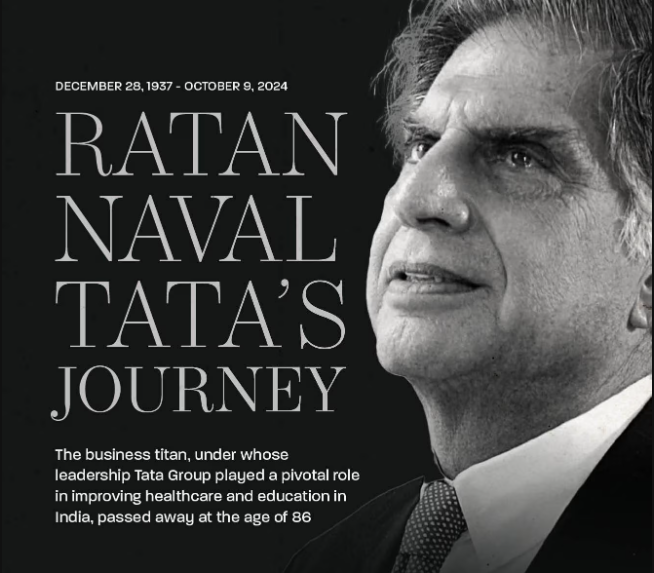Do You Know Why Ratan Tata’s Journey Is a Timeless Lesson in Leadership
Ratan Tata’s life story is not just a biography—it’s an inspiration for millions around the world. From overcoming early loneliness to transforming the Tata Group into a global powerhouse, his journey teaches us humility, service, leadership, and the power of values. Dive deep into his story, learn how he became the face of Indian industry, and why he remains the most respected business leader in India.
BUSINESS & ECONOMY
Do You Know Team
8/15/20255 min read


Few business leaders in the world are respected not just for their wealth, but for their values. Ratan Naval Tata is one of those rare icons. Known for his honesty, humility, philanthropy, and revolutionary leadership, Ratan Tata transformed the Tata Group from a traditional Indian conglomerate into a global business empire.
His story is not simply about running a company—it’s about leading with integrity, compassion, and courage. He started out as a shy young man, raised by his grandmother, and eventually went on to become the chairman of India’s most trusted and largest industrial group. Along the way, he made bold decisions, faced controversies, showed kindness, supported startups, and donated billions for social causes.
Let’s explore the full journey of Ratan Tata—a journey that offers lessons far beyond business.
1. Early Childhood and Family Background
Ratan Naval Tata was born on 28 December 1937 in Bombay (now Mumbai), India. He belonged to the prominent Tata family, a Parsi family known for philanthropy and business. His parents, Naval Tata and Sooni Tata, separated when he was just 10 years old. After the divorce, Ratan and his younger brother Jimmy were raised by their grandmother, Lady Navajbai Tata.
Despite wealth, his childhood was emotionally difficult due to the separation. This taught him resilience early in life.
Quote: “Ups and downs in life are very important to keep us going, because a straight line, even in an ECG, means we are not alive.”
2. Education and Early Academic Life
He studied at Campion School in Mumbai, followed by Cathedral and John Connon School.
Later, he moved to the United States and completed his B.S. in Architecture from Cornell University in 1959.
After completing his studies, he worked briefly at Jones & Emmons, a famous architectural firm in Los Angeles.
Interestingly, his original dream was to become an architect or engineer—not an industrialist.
3. Joining the Tata Group: Starting from the Bottom
In 1962, Ratan Tata joined the Tata Group, starting as a blue-collar trainee at Tata Steel, working alongside laborers, shoveling limestone, handling blast furnaces, and learning the business from the ground up.
This humble beginning helped him understand the value of dignity of labor and employee respect.
4. Rising Through the Ranks
Over the next two decades, Ratan Tata worked in different Tata companies, learning how business divisions function across operations, marketing, and manufacturing. His honesty, discipline, and commitment stood out, and the then-chairman J.R.D. Tata noticed his potential.
He was appointed chairman of Tata Industries in 1981, where he began to modernize the group’s management structure.
5. Becoming Chairman of Tata Group
In 1991, J.R.D. Tata stepped down and chose Ratan Tata as his successor. Many senior executives were unhappy about this choice, as they felt he lacked financial background. But Ratan Tata proved himself with bold decisions that brought Tata Group into the global era.
6. Global Expansion and Acquisitions
Under Ratan Tata’s leadership, the Tata Group went global:
Acquired Tetley Tea (UK) in 2000
Acquired Corus Steel (UK) in 2007
Acquired Jaguar and Land Rover (JLR) from Ford in 2008 for $2.3 billion
Tata Group’s revenues grew from $5 billion to $100 billion under his tenure!
These were bold moves that turned Tata from an Indian group into a global brand.
7. Launching Tata Nano: The People's Car
One of his most ambitious projects was the Tata Nano, launched in 2008 with a price tag of just ₹1 lakh (approx. $2000). His dream was to make a safe and affordable car for Indian families riding motorcycles.
Though the Nano failed commercially, it showed his heart was in the right place.
Quote: “I don’t believe in making the right decisions. I take decisions and then make them right.”
8. Philanthropy and the Tata Trusts
Richard Tata and Jamsetji Tata built a tradition of charity in the family. Ratan Tata carried this forward:
He donated extensively to education, medicine, rural development, and disaster relief.
Tata Trusts (controlled largely by the Tata family) own over 66% of Tata Sons, which funds charitable works.
Donations include:
$50 million to Harvard Business School
$25 million to Cornell University
₹15 billion for COVID-19 response in India
Massive support for child cancer patients, water projects, etc.
9. Leadership Style: Values Over Profits
Ratan Tata believes ethical leadership is more important than temporary profit.
He refused to bribe politicians, even if it slowed approvals.
Supported employees, even if business suffered.
When the 26/11 terrorist attacks hit the Taj Hotel (owned by Tata), he personally visited and supported injured staff and families.
10. Investments in Indian Startups
Even after retirement, Ratan Tata became active in India’s startup scene:
Invested in Ola Cabs, Snapdeal, Paytm, CureFit, Urban Ladder, FirstCry, etc.
He sees startups as the future and supports young entrepreneurs.
This made him a favorite mentor of India’s youth.
11. Controversies and Challenges
Even a respected leader faces backlash:
Faced controversy due to factory protests in Singur, West Bengal for Tata Nano.
Legal battle with Cyrus Mistry after he was removed as chairman in 2016.
Criticized for entering textile and airline industries again (Air India acquisition).
Still, even critics admire his honesty and patriotism.
12. Awards and Recognition
Ratan Tata has numerous Indian and international awards, including:
Padma Bhushan (2000)
Padma Vibhushan (2008)
Honorary Doctorates from universities like Harvard, Warwick, etc.
Ranked among world’s most influential business leaders
13. Personal Life: Simple, Private, Graceful
Ratan Tata never married. He once said he fell in love in the US but had to return to India, and the girl’s parents didn’t let her relocate. He has no children. He lives a simple life in a modest house in Colaba, Mumbai. He drives himself sometimes and travels with minimum security.
He loves dogs and has created special kennels in Bombay House for stray dogs.
14. Quotes That Define His Beliefs
Some of his most powerful quotes include:
“None can destroy iron, but its own rust can. Likewise, none can destroy a person, but his own mindset can.”
“If you want to walk fast, walk alone. If you want to walk far, walk together.”
“People still believe what they read is necessarily the truth.”
15. Legacy and Inspiration
Ratan Tata’s legacy is not just about big business or massive wealth. It’s about values:
Putting nation-building and public service above personal benefit
Proving that companies can succeed with honesty
Motivating youth to build, innovate, and serve
Inspiring a generation that dreams of creating impact, not just profit
FAQs
Q1: Was Ratan Tata born into a wealthy family?
Yes, he was born into the famous Tata family, but his parents separated early, and he faced emotional struggles.
Q2: Did Ratan Tata study engineering?
He studied architecture at Cornell University, not business or engineering.
Q3: Why is Ratan Tata so respected?
He combines business success with philanthropy, ethics, humility, and nationalism.
Q4: Did Ratan Tata get married?
No, he never married. He remained single throughout his life.
Q5: What Was Ratan Tata were doing before his dismissal?
He was Chairman Emeritus of Tata Sons and Tata Trusts, mentors startups, invests in new companies, and continues philanthropy.
Conclusion
The life of Ratan Tata proves that greatness is not measured by wealth alone. It is measured by how we treat others, how we lead, and how we serve the country. In a world full of greedy businessmen, his life shows that even giants can remain humble.
From a lonely child to a global icon of integrity, Ratan Tata’s journey is a timeless lesson in leadership, compassion, and vision. He remains a shining example of how we can be successful and still stay grounded, ethical, and human.
“I have always been very confident and very upbeat about the future potential of India. I think it is a great country with great potential.” – Ratan Tata
#RatanTata #DoYouKnow #IndianBusinessLegends #LeadershipLessons #TataGroup #RatanTataQuotes #InspiringStories #IndianIcons #Philanthropy #YoungEntrepreneurs #BusinessEthics
Knowledge
Empowering minds with reliable educational content daily.
Newsletter Signup
© 2025 DoYouKnow. All rights reserved.
Stay Ahead of the Trends – Join Our Newsletter
